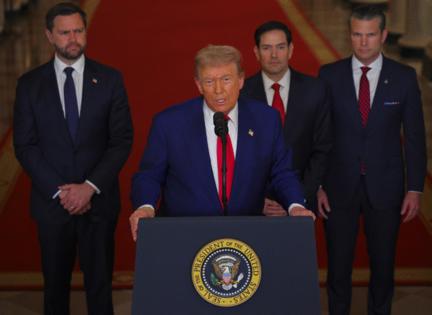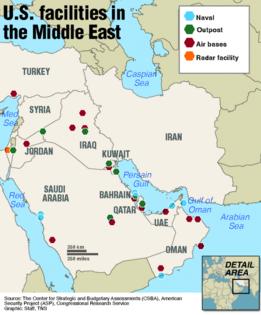Trump sees chance to de-escalate Mideast war after Iran response
Published in News & Features
President Donald Trump raised hopes of de-escalating the Middle East conflict after Iran’s strike against a U.S. base, saying the attack was “very weak” and telegraphed ahead of time by Tehran.
“I want to thank Iran for giving us early notice, which made it possible for no lives to be lost, and nobody to be injured,” the president said in a social media post Monday. “Perhaps Iran can now proceed to Peace and Harmony in the Region, and I will enthusiastically encourage Israel to do the same.”
Iran fired missiles at the Al Udeid Air Base in Qatar earlier Monday after promising it would respond “proportionately and decisively” to the weekend bombing by U.S. forces of three nuclear facilities. Qatar said the missile barrage was intercepted and the base had been evacuated in advance.
Oil plunged on relief that Tehran’s limited response offered the prospect of easing tensions in the conflict, which began 10 days ago when Israel attacked Iran’s nuclear and missile installations and military leaders. Iran has responded with several days of missile strikes on Israel.
Trump said Iran fired 14 missiles toward the Qatar base, of which “13 were knocked down, and 1 was ‘set free,’ because it was headed in a nonthreatening direction.” The president added: “Most importantly, they’ve gotten it all out of their ‘system,’ and there will, hopefully, be no further HATE.”
In another post, moments later, he added: “CONGRATULATIONS WORLD, IT’S TIME FOR PEACE!”
Trump’s remarks stand in sharp contrast with his increasingly belligerent rhetoric during the past few days. After ordering the weekend bunker-buster bombing he hinted at “regime change” in Iran, and said that any retaliation by Tehran would be met by “FAR GREATER” force.
But the limited nature of Iran’s missile salvo and the advance warning that was provided appear to have been welcomed by the president as a potential off-ramp.
Iran’s move on Monday appeared to be “a largely symbolic retaliation,” said Ziad Daoud, Bloomberg Economics’ chief emerging-market economist. “Plenty of warning was given — Qatar shut its airspace and the U.S. issued warnings to citizens.”
Trump earlier said the nuclear sites targeted by the U.S. were totally destroyed. Defense Secretary Pete Hegseth said the strikes had the “limited” objective of eliminating Iran’s atomic program. Officials have said it’s too early to definitively assess damage.
Al Udeid is the regional headquarters for U.S. Central Command, which oversees the American military in the region, and home to several thousand U.S. service-members.
Some of Qatar’s Gulf Arab neighbors including Bahrain, which hosts a U.S. naval base, and the United Arab Emirates also closed their airspace late Monday as a precaution, though in most cases it was reopened within hours. Qatar, the UAE and Saudi Arabia issued statements condemning the Iranian attack.
Oil prices began to slide immediately after reports of the strike, and extended losses after Trump’s latest post.
Crude had previously climbed during the 10-day conflict, amid concerns that Iran could target oil facilities or shut down the Strait of Hormuz, a key energy corridor.
But Brent had erased a large chunk of that increase by 4:30 p.m. in New York, plunging almost 9% on the day. U.S. stocks also climbed, reversing earlier losses.
Behind those market moves were reports that Iran’s missile launch had been telegraphed. The U.S. and its allies were expecting the strike, according to a person familiar with Western intelligence assessments. U.S. diplomatic missions advised Doha-based residents earlier in the day to shelter in place “until further notice.”
Iranian officials also suggested the move had a symbolic element. The number of missiles fired matched the number of bombs deployed by the U.S. against the nuclear sites at Fordow, Natanz and Isfahan, and the Qatar strike “poses no danger” to a “friendly and brotherly country,” the state-run IRNA news agency said.
Israel says its war against Iran aims to prevent the country from acquiring atomic weapons, a risk also cited by Trump to justify U.S. involvement. Iran denies ever having sought a nuclear bomb.
Before the Israeli attack on June 13, American and Iranian negotiators had held several rounds of talks aimed at a new agreement on curtailing Iran’s program — to replace the 2015 nuclear deal which Trump abandoned during his first term.
Since then, Trump has alternated between military threats and hints of renewed diplomacy. His envoy in the earlier negotiations, Steve Witkoff, has been in contact with Iran since the U.S. strikes, CNN reported Monday. Tehran has said it won’t rejoin talks while under attack.
Israel ratcheted up strikes on various Iranian targets earlier on Monday, and the Israeli military warned residents of Tehran to expect more in the coming days. Iran also fired several missiles at Israel.
_____
(With assistance from Dana Khraiche, Golnar Motevalli, Eltaf Najafizada and Kate Sullivan.)
_____
©2025 Bloomberg L.P. Visit bloomberg.com. Distributed by Tribune Content Agency, LLC.










Comments